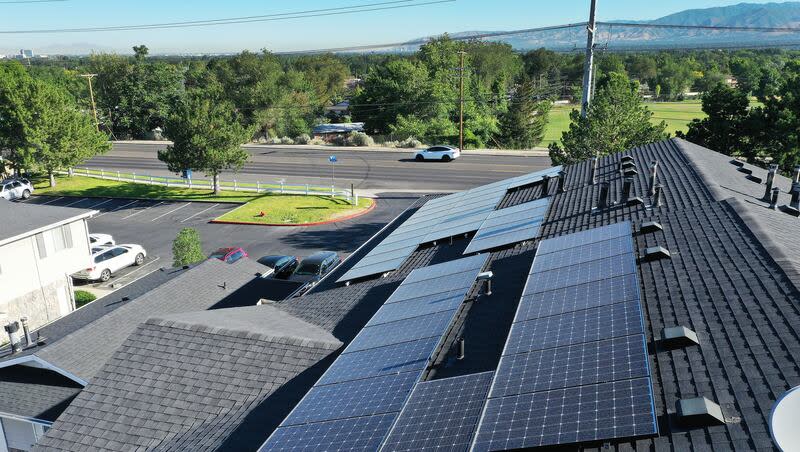Solar bill aims to protect Utah consumers amid fraud complaints

A bill that some clean energy advocates fear could deter rooftop solar purchases but supporters say protects consumers was heard in a legislative committee on Tuesday.
HB215 is sponsored by Rep. Colin Jack, R-St. George, and prohibits any start to the installation of rooftop solar for seven days after a contract has been inked and mandates a refund within 10 days by the company should the buyer decide to opt out.
The bill also provides for a fine of up to $2,500 for a violation of this provision and potential legal action. The bill was heard in the Senate Natural Resources, Agriculture and Environment Committee and passed on a 4-1 vote.
The bill comes after multiple Utah-based solar customers and installers shut down, leaving customers with systems that did not live up to the paperwork promises on the delivery of energy or didn’t deliver energy at all.
Jack, who has worked in the electric utility space for decades, said Utah’s booming solar business has operated much like the “wild wild West,” with not enough oversight.
“We have done a lot of incentives but we have not taken much responsibility or much control,” he said.
Exercising oversight
He said he’s fielded many, many calls from solar customers who did not get the return on their investment they were hoping for and sought help from the utility sector.
“And a lot of them were complaints that the utility was not making the system work as advertised, as the salesman had promised, and then a lot of customers were disappointed when I explained to them the math and why they were not told the truth. And then they’re like, ‘What I just spent $30,000, $40,000 or $50,000 on this, who’s going to make it right?’ And I’m like sorry, I don’t know.”
Shawn Guzman, the city attorney for St. George, echoed the concerns Jack voiced.
“St. George City is the largest municipal electrical utility in the state. And we routinely receive complaints from customers that feel they’re not getting the return on investment that was promised when they were sold the solar panels. And they look to us to somehow remedy that situation. We’ve had both commercial and residential, mostly residential, that have contacted us and complained.”
He pointed out that some elderly relatives, in their 80s, bought solar panels and will never realize the savings because of their age.
“Now, they’re not all bad actors. I want to make that clear,” he said. “But there are enough that having a seven day waiting period seems very reasonable for such a large investment because those good actors merely have to wait the seven days and move forward.”
But Sen. Nate Blouin, D-Salt Lake City, said he was uncomfortable with the bill’s provisions, having heard feedback from area solar providers.
He particularly objected to the provision asking for a written contract, instead of a legal document in digital form, adding it was punitive. He voted no on advancing the bill.
Katie Hass, director of the Utah Division of Consumer Protection, said door-to-door solicitors often show up with an iPad and ask people to sign the contract digitally. Some of the customers are older, are not as tech savvy or an electronic version of the contract could be emailed, but only after days and the clock of recision is ticking. Or the computer system in which to view the contract is down or can’t be accessed.
“I find it difficult to believe that sending someone a paper copy when they would like one is a punitive measure on a contract that’s worth $30,000 to $50,000,” she said.
Consumers, too, can opt out of a paper contract if they prefer it only a digital form.
Complaints beyond Utah’s borders
Several Utah-based solar installation companies were the target of an investigation by the Minnesota Attorney General’s Office on behalf of consumers residing in that state.
“The Attorney General’s Office has received dozens of complaints and sworn statements about these companies from Minnesota consumers,” a 2022, press release read at the time. “The complaints sparked an investigation in which the office found that since these companies were started, they have falsely represented that their salespeople work for, or are partners with, local utilities despite cease-and-desist letters and other warnings to consumers from utilities across the country.”
Thirteen of those complaints resulted in the consumer protection agency taking administrative action against a company. All have since closed their doors.
The top 10 consumer complaints logged by the Utah consumer division for fiscal year 2022 listed “solar” as No. 9.
“We’ve felt like a seven day cooling off period for people to make an informed decision about these contracts after a high pressure sales pitch would be valuable, particularly with our senior citizens — giving them time to maybe talk to a trusted loved one before they invest in a major project like solar,” Hass said.
Added Jack: “I’ve had some pushback from my own side of the aisle about interfering with free enterprise,” he said. “I just pointed out that, you know, we’ve spent a lot of years chumming the waters off the beach. And I think we take some responsibility, put shark watchers in the lifeguard chairs because it’s not safe in the water until we take care of some of the bad actors.”

